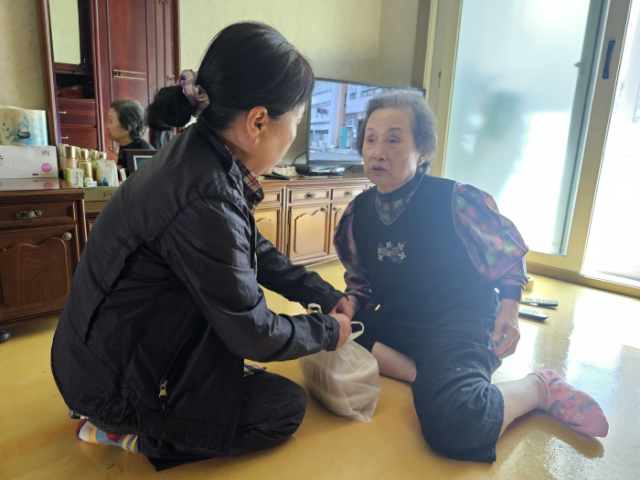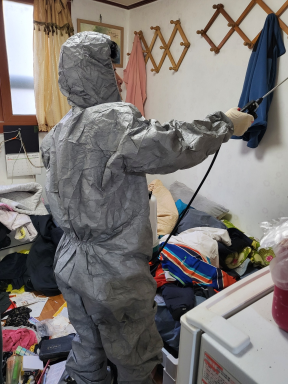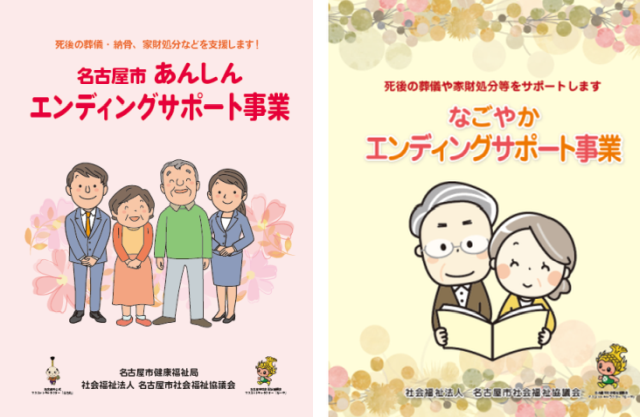[Case 23] Ending Support Program in Gwangju Metropolitan City: Helping Older Persons Die With Dignity
Ending Support Program* in Gwangju Metropolitan City:
Helping Older Persons Die With Dignity
* Ending Support Program is the name of a local government program providing end-of-life support, which helps older people die with dignity. Although the phrase sounds like ending of the support in general, we use the original name, "Ending Support” Program, since it is a proper noun referring to that specific program.
Population ageing is a global phenomenon that affects many countries (UN/DESA, 2023), and the percentage of older persons who live alone has increased over the years in Korea (Statistics Korea, 2023). These trends may result in the rise of social issues such as lonely death, which has become a reality for some older people. Gwangju Metropolitan City in Korea has responded to this concern by implementing an innovative social welfare program named Ending Support, which helps older people die with dignity. This report introduces the Ending Support Program offered in Usan-dong (“Dong” is the basic administrative division in Korea), Gwangsan-gu (“Gu” refers to district), Gwangju Metropolitan City, and discusses its significance. The paper also explores similar initiatives in Japan.
Eighty percent of Koreans reported that they had someone to turn to when they needed help, a figure that is significantly lower than the OECD average of 91% (OECD, 2020). It is possible to believe that this lack of social contact is related to the increase in lonely deaths in Korea, which totaled 3,378 in 2021 and have increased by an average of 8.8% per year, according to the lonely death survey (Korea Ministry of Health and Welfare, 2022). Gwangju Metropolitan City has thus devised countermeasures to reduce lonely deaths among older people in the area. Usan-dong, in particular, has the second-largest older population in Gwangsan-gu, with 15.7% of residents being 65 or older (4,542 out of 28,951 persons as of February 2024), exceeding the city’s average of 11.3%. Furthermore, Usan-dong has a high proportion of single-person households (49% of total households compared to the national average of 42%), with 30% of these households composed of adults aged 65 or older (Korea Ministry of the Interior and Safety, 2024). Five to seven lonely deaths occur in Usan-dong each year. In response to this, Korea's first Ending Support Program was launched in Usan-dong in May 2023 to provide care services and prevent lonely deaths in those older single-person households where older people may have lost their family ties or family care is not expected.
Out of the 650 elderly single-person households in the region, 150 were identified as being at high risk of lonely death. 2 Local Ending Supporters (36 volunteers in total under the Program) contact with these older persons to monitor their well-being every three days. Additionally, if needed, the volunteers facilitate access to home-visiting medical services for those with mobility issues. After-death services are provided, encompassing financial aid for funeral service expenses and assistance with administrative tasks like death registration. Meanwhile, neighbors assist in arranging and disposing of the deceased's belongings.
Wellness Checks and Friendly Visits: A Volunteer Delivering Side Dishes and Checking on the Well-Being of the Older Person
(Photo Credit: Usan-dong Community Service Center)
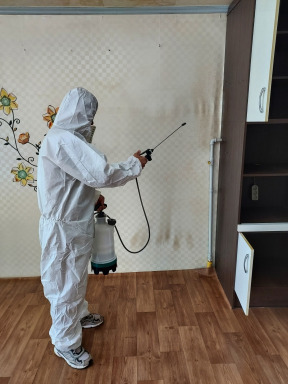
After-Death Services: Clearing Out the Deceased's Belongings and Sanitizing Their Home
(Photo Credit: Usan-dong Community Service Center)
The Ending Support Program in Usan-dong, which was selected for the 2023 Gwangju Local Welfare Community Development Project and had an initial budget of 10 million Korean won (approximately 7,400 US dollars), runs under a public–private partnership. Various social and medical organizations in Gwangsan-gu, including local community welfare centers, rehabilitation facilities, community health centers, clinics, Hanam Sungshim General Hospital, and local funeral homes, are actively participating in the Program. The Usan-dong Community Service Center is the hub of this cooperative system – it delivers resources and services based on the needs of clients identified by Ending Supporters during friendly visits.
Since the start of the Ending Support Program in May 2023, there have been no lonely deaths in Usan-dong. The older people the Program has supported include 64-year-old Kim, who died of pancreatic cancer but whose family refused to claim the body; 81-year-old Son, with intellectual disabilities, who was unmarried and died of lung cancer; and 91-year-old Park, who was unable to afford a funeral. These individuals passed away while receiving welfare services under the Program.
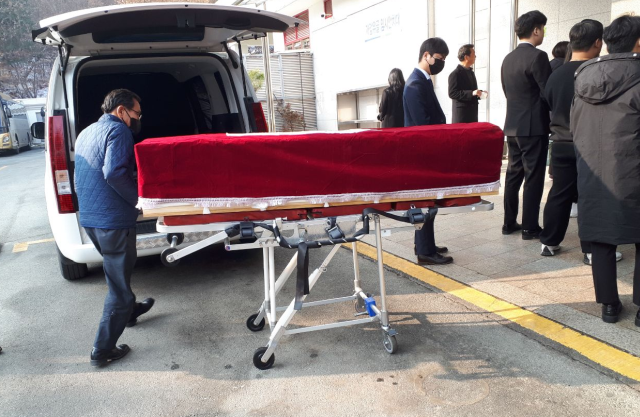
(Photo Credit: Usan-dong Community Service Center)
As older persons living alone are more vulnerable to emergencies, routine wellness checks and friendly visits play a crucial role in preventing lonely deaths. For example, during a visit, volunteers may encounter an older person who has fallen and is unable to move. Many of these older persons do not have guardians who can transport them to hospital, possibly because they reside far from family, have no children, or have lost touch with their offspring. Ending Supporters often accompany them to hospital.
The Usan-dong Ending Support Program provides a holistic range of services involving wellness checks, support for funeral expenses, household cleanups, and death registration. This comprehensive approach ensures that isolated older people at risk of lonely death can maintain their dignity throughout their lives, receiving more effective assistance than they had previously accessed.
The Program also demonstrates that the care gap, which is challenging to tackle solely through public welfare, can be addressed successfully both through community engagement in a participatory care network that involves local residents, and through fostering resource-sharing among private organizations. The Program serves as a compelling example of how community solidarity, mutual interest and mutual consideration can mitigate the risk of lonely death, ensuring that everyone in this ageing society can die with dignity.
The Usan-dong Program is comparable to those widely implemented by Japanese municipal governments. According to the 2022 Annual Report on the Ageing Society (Cabinet Office of Japan), about 6.72 million older people, nearly a fifth of Japan’s entire older population, live alone. Most of these individuals have been classified as vulnerable, and unprepared for later life. Japan has experienced various societal issues as a result of the country’s ageing population and the increase in single-person households. Their versions of the Ending Support Program aim to solve these problems by supporting funeral and burial contracts, wellness check services, and “Shuukatsu” (終活 or end-of-life preparations), a preparation for death.
In this era of extended life expectancy and ageing populations, older people are actively preparing for their deaths. This cultural phenomenon gained prominence in Japan around 2010 with the introduction of the term “Shuukatsu.” End-of-life preparations include arranging keepsakes, drafting wills and organizing inheritance, expressing preferences for care and caregiving, and making arrangements for funerals and burial. The primary focus of Japan’s Ending Support programs lies in facilitating funeral and burial planning. This aims to alleviate the burden on local government of dealing with unclaimed bodies, an increasing problem with the rising instance of lonely deaths. Local government facilitates connections between older persons and local funeral service providers, enabling them to make funeral and burial arrangements at reduced cost. Local government also oversees contract management to ensure that obligations are fulfilled after the passing of older persons.
In 2015, in Yokosuka, Kanagawa Prefecture, a 79-year-old man said in his will, “I have barely 150,000 yen (approximately 990 US dollars). Can you manage cremation and an unmarked grave? There is nobody to take over my body.” However, his requests were not fulfilled: the municipal authorities were unable to use his inheritance for funeral expenses because his younger sister was his legal heir. Subsequent to this, Yokosuka City introduced the Ending Plan support program for older people living alone without immediate relatives. This initiative includes arranging contracts with local funeral service providers, offering counseling on end-of-life matters and final wishes, conducting wellness checks, and preventing lonely death. Many local governments have adopted this kind of program as a model for end-of-life support, each imposing distinct eligibility criteria. Yokosuka City, for instance, requires applicants to meet the following conditions: (1) a monthly income of 180,000 yen or less; (2) savings and deposits totaling 2.5 million yen or less; (3) a fixed asset valuation of 5 million yen or less; and (4) being a citizen aged 65 or older living alone. People who are unwell or disabled may also qualify for consideration, even if they do not meet all the criteria. Following this, Yokosuka City implemented the Registration for Citizen’s End of Life Planning Program in 2018. It allows all citizens to register information related to end-of-life preparations, including funeral and storage contracts, the location of their will, and their preferred burial site, thereby aiding older people to prepare for any unforeseen circumstances.
Nagoya City, like Yokosuka City, operates a similar initiative, called the Reliable Ending Support Program for older people living alone with low incomes. Monthly wellness checks are conducted by phone, and supplemented by biannual home visits to monitor the person’s well-being. Should they pass away, the Program arranges for the organization of household belongings, utilizes deposits to settle debts and cover medical expenses, and handles the necessary paperwork for death registration.
The Program is commissioned by the Nagoya City Council of Social Welfare, which also operates the Nagoyaka Ending Support program (“Nagoyaka” can be translated as “gentleness”). This Program offers not only end-of-life care and wellness checks, but also hospital accompaniment and assistance with the admission and discharge procedures. Targeting individuals aged 65 or older without children, who can afford an initial deposit of approximately 500,000 yen, the Program distinguishes itself from the local government's Ending Support program by not being restricted to low-income, tax-exempt individuals. Instead, it requires a registration fee of 16,500 yen and an annual usage fee of 11,000 yen. Moreover, it offers optional hospital accompaniment and assistance services for an additional charge.
Front covers of brochures for Nagoya City’s Reliable Ending Support program (left) and Nagoya City Council of Social Welfare’s Nagoyaka Ending Support program (right)
(Source: Nagoya City Council of Social Welfare Website)
End-of-life support programs, such as those in Usan-dong and Yokosuka City, offer proactive and comprehensive solutions to addressing the issue of lonely deaths in an ageing society. These programs enhance the well-being of seniors by facilitating dignified end-of-life experiences, foster community solidarity through collaboration among volunteers, public institutions, and social welfare organizations, and play a vital role in preventing social isolation among older people. Furthermore, these programs cultivate positive societal perspectives on death, and nurture a culture that embraces death as an intrinsic aspect of the human life cycle.
A notable aspect of Japan’s end-of-life support programs involves collaboration among local governments and various stakeholders to honor individuals’ wishes even after death through the use of notarized wills and contracts. In Korea, discussions on dignified death revolve around drafting wills and issuing advance directives for life-sustaining treatment. However, older persons living alone face the risk of their wills going unfulfilled after their passing. The end-of-life support programs help people make autonomous decisions while preparing for death, and ensure that they can pass away with dignity by having local government act as their representative following their demise.
The models of Usan-dong and Japan hold considerable importance for other countries and communities, showcasing innovative approaches and emphasizing the importance of social solidarity and cohesion in tackling the issues of ageing populations and isolation. They serve as tangible solutions, facilitated by local government support, to mitigate the various social issues arising from lonely death. These programs can be expected to improve the well-being of older people globally.
